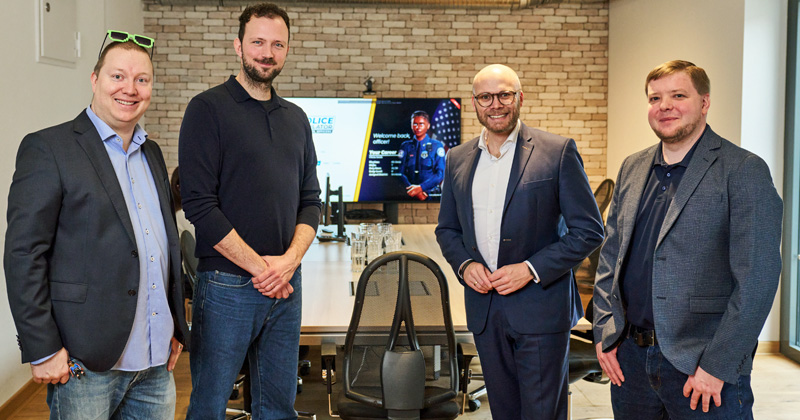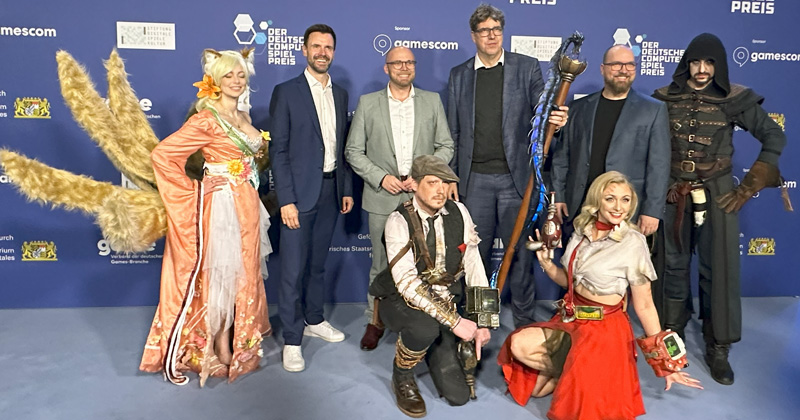Advertisement
There is already a House of Art in Munich – now comes a 'House of Games': Why Digital Minister Mehring is investing in Die Gamerei.
The Bavarian computer games industry has been used to troubles in recent decades. Large parts of the industry must therefore currently feel like they are in the wrong film: Wait, the digital minister responsible for games is proactively approaching the industry? He's taking on concerns? He's visiting industry events and studios? Voluntarily?
In fact, Fabian Mehring – re-elected to the state parliament in autumn 2023 on the Free Voters ticket – strikes a noticeably different tone than his CSU predecessor Gerlach, who has since retrained in health. In the ministry of the politician with a doctorate, a separate department deals with games – and in the funding league, Bavaria continues to be consistently at the top, together with NRW and Berlin/Brandenburg.
The next stage will take place on July 26th – the official opening of Die Gamerei. Spread over three floors and 1,000 square meters, the striking round building in the east of Munich is to be developed into a 'House of Games' – a contact point for the Bavarian games industry. Developers, startups and companies can rent space there at relatively low rates – the first studios have already signed up.
Advertisement
Mehring's ministry is initially subsidizing the start of the project with €560,000. In an interview with GamesWirtschaft, the 35-year-old explains what he plans to do with the game and how he views the games industry in the Free State.

GamesWirtschaft: Mr. Minister, the implementation of the 'Gamerei' was unusually quick – there were only a few months between the announcement in February and the implementation in July. Was it also convenient for you that a suitable property became available in the form of the former Mimimi Games building?
More: Our timeline was independent of the Mimimi location. We made a virtue out of necessity because there was already a top property in Munich with the necessary infrastructure. But of course we also negotiated with other providers and looked at various properties.
In the end, it was a perfect fit at the former Mimimi headquarters – also because Johannes Roth (Mimimi co-founder, editor's note) was a great partner. We had a lot of good conversations because he is also someone whose heart beats for games.
It was important to me that I didn't announce a 'Year of Games' in autumn 2023 and then the House of Games would come three years later. If I promise something, I want to keep it and deliver it promptly.
There have been attempts in the past to combine a co-working space with a start-up center and events for the games industry – in Munich and elsewhere. What makes you confident that Gamerei will work out well this time?
Firstly, there is feedback from the industry. My feeling is that we don't have to worry too much about finding enough suitable tenants, but that the spaces will be snatched out of our hands.
On the other hand, I am also concerned about visibility for the industry – for this we also need event spaces in which we can show what Bavaria's games scene can do. This will be a real home for the games industry in the Free State.
Gaming – who came up with this term? What do you associate with it?
This was an intensive, iterative process with the close personal involvement of the minister, which brought half of my ministry to a standstill for an entire morning (laughs).
Because we couldn't decide, I even called representatives from the games industry and asked what they thought about our ideas. In the end, the name “Gamerei” won us over because it makes it clear what we're all about: games in Bavaria!

Speaking of games in Bavaria: You have been in office since November – what state did you find the industry in in the Free State?
To be honest, it's a highly dynamic scene that I've grown very fond of since day one. I quickly understood that things in the industry are very different from how they are often portrayed politically. Gamers are great people who react extremely positively when you take them seriously – as I did – and try to give them maximum political support.
Together we have now given Bavaria a real boost as a gaming location.
In the past, games have often been perceived somewhat neglectfully by politicians and the public. That's why it was so important to me to reverse this image – and that's why I took office as Games Minister with a big vision and very specific goals. Now I attach great importance to ensuring that words and actions match up.
This is important to me for two reasons: Firstly, because I am deeply convinced that the importance of the industry as an innovation driver for digital transformation is still wrongly underestimated. I think it's great that this message is slowly getting through.
That's what I thought when I visited GG Bavaria with the Secretary of State for Economic Affairs, Tobias Gotthardt: It may surprise some people that a global corporation like BMW is exhibiting at GG Bavaria. But this follows a very clear strategy: BMW is looking for top talent for digital transformation – and that's exactly what you can find among the innovation drivers in the games industry.
Politicians must also understand that promoting the games industry is a modern element of our industrial and location policy in Bavaria. The truth is: We have almost 350 companies in Germany with 3,500 employees and a total turnover of €10 billion. With any other industry, it would be clear from this relevance that it would need political support. But with games, people still act too often as if it were just a hobby for a few nerds. We have changed that in Bavaria.
I was annoyed by the disdain shown for the pixel pioneers in the gaming world and that's why I stepped on the gas so much – more funding, our own department in-house and the next thing we're delivering is gaming. We want to give gamers in Bavaria a visible home.
We want to show that this is the place where the heart of the Bavarian games industry beats. And it is just as important as other sectors of the economy.

The 2024/25 double budget is now available. Are you happy with the games budget? Can we work with it?
It is difficult to please someone who does politics with my mentality. But the truth is that I would be happy with Bavaria. must.
Why? Because we in Bavaria have increased our funding again and are trying to mitigate the total loss of the federal government. Of course, we as a state cannot do this in its entirety. Nevertheless, the level at which we can now provide support is already a pretty big success for me.
Judging by what is happening in Berlin, or not happens, we are an extremely reliable partner in Bavaria – and I am pleased that word is getting around.
Read also: These 10 politicians will have a significant influence on the fate of the German computer games industry in 2024.
